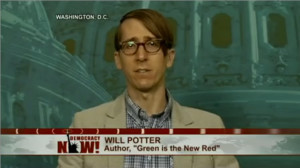Will Potter's Blog, page 20
April 26, 2013
Tennessee Lawmaker Compares Factory Farm Investigations to Rape
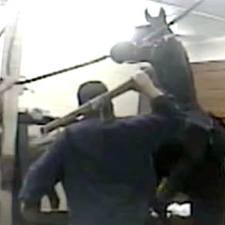 In Tennessee, a sweeping “ag-gag” bill is about to become law. It’s just waiting for the governor’s signature. The public backlash against these bills continues to grow, and groups like the Humane Society and celebrities like Carrie Underwood are calling for a veto. The ACLU is sending out action alerts to stop the bill. Every major newspaper in Tennessee has come out against the proposal: The Tennessean called it “despicable and unconstitutional.”
In Tennessee, a sweeping “ag-gag” bill is about to become law. It’s just waiting for the governor’s signature. The public backlash against these bills continues to grow, and groups like the Humane Society and celebrities like Carrie Underwood are calling for a veto. The ACLU is sending out action alerts to stop the bill. Every major newspaper in Tennessee has come out against the proposal: The Tennessean called it “despicable and unconstitutional.”
So how have Big Ag and allies responded?
Check out this exchange between the Humane Society and state representative Andy Holt, who compares undercover investigations to sexual trafficking and calls them “tape and rape.” Keep in mind, he is referring to investigations that have exposed horrific animal cruelty in his state:
From: Andy Holt [rep.andy.holt@capitol.tn.gov]
Sent: Wednesday, April 17, 2013 11:26 PM
To: Kayci McLeod
Cc: Andy Holt
Subject: RE: Please Oppose HB 1191
Ms. McLeod,
I am extremely pleased that we were able to pass HB 1191 today to help protect livestock in Tennessee from suffering months of needless investigation that propagandist groups of radical animal activists, like your fraudulent and reprehensibly disgusting organization of maligned animal abuse profiteering corporatists, who are intent on using animals the same way human-traffickers use 17 year old women. You work for a pathetic excuse for an organization and a pathetic group of sensationalists who seek to profit from animal abuse. I am glad, as an aside, that we have limited your preferred fund-raising methods here in the state of Tennessee; a method that I refer to as “tape and rape.” Best wishes for the failure of your organization and it’s true intent.
Andy Holt
State Representative – District 76
Weakley & Northern Carroll Counties
205 War Memorial Building
301 6th Ave. North
Nashville, TN 37243
615.741.7847
rep.andy.holt@capitol.tn.gov
——————————————————————————–
From: Kayci McLeod [mailto:kmcleod@humanesociety.org]
Sent: Wednesday, April 17, 2013 1:44 PM
To: Andy Holt
Subject: Please Oppose HB 1191
Dear Representative Holt,
Have you seen the editorial in the Tennessean today opposing HB 1191, the whistleblower suppression bill intended to cover up animal cruelty?
The Tennessean editorial board condemns the bill, noting that the “bill would certainly take our state in the wrong direction, toward more senseless violence.”
We very much hope you’ll agree with the Tennessean and oppose this dangerous bill. Thank you for your time and consideration.
Kayci McLeod
Public Policy Coordinator
Farm Animal Protection Campaign
The Humane Society of the United States
T: 301 258 1564
Factory farms are freaking out about “radical animal rights groups” (like the Humane Society, apparently) but ag groups and their allies are their own worst enemies.
Shame on TN lawmakers for passing the Ag Gag bill. If Gov. Bill Haslam signs this, he needs to expect me at his front door. Who’s with me?
— Carrie Underwood (@carrieunderwood) April 18, 2013
April 25, 2013
URGENT: Indiana Ag-Gag Bill Resurfaced, Democrats Ousted from Committee
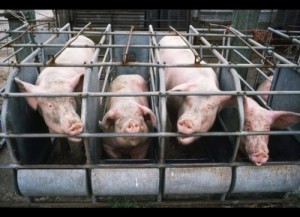 If you know anyone in Indiana, please share this immediately. Indiana’s ag-gag bill, which makes it illegal to expose factory farms, clearcutting, and fracking, has resurfaced and it is being rushed through the legislature.
If you know anyone in Indiana, please share this immediately. Indiana’s ag-gag bill, which makes it illegal to expose factory farms, clearcutting, and fracking, has resurfaced and it is being rushed through the legislature.
The bill had been watered down in response to massive public backlash against it. But now, Senate Bill 373 has all the anti-consumer language all over again. The provisions were inserted by the original Senate author Travis Holdman(R). As the Indianapolis Star reports:
Sen. Karen Tallian, the Portage Democrat who was removed from SB 373, accused Republicans of “dirty rotten kind of blackmail technique” to try to get her to approve the bill.
She said she had talked the penalty down to an infraction — akin to a speeding ticket — rather than a misdemeanor that carries a penalty of up to a year in jail.
“They came to me and said, ‘Make the choice. Either you sign it and it will stay an infraction with the Senate version or don’t sign it, and all this other stuff is going in,” Tallian said. “We agreed uanimously (in the Democratic caucus) that we weren’t buying this. It’s a bad bill and we’re not signing.”
Because the Democratic conferees refused to sign the revised version, Republican legislative leaders removed them from the committee.
The bill criminalizes anyone who video records or photographs animal welfare, environmental, workers’ rights, and health violations not just in factory farms, but in any industrial or mining operation as well. Anyone who records such abuses has 5 days to turn the footage over to police — but they are expressly prohibited from giving it to the media.
I just found out the committee is voting tomorrow. If you care about the environment, animal welfare, workers’ rights, or food safety, act now:
Contact Speaker of the House Brian Bosma as well as President Pro-tem of the Senate, David Long, and urge them not to support the Ag Gag Bill conference report and stop this legislation. Tell them instead of trying to shield bad actors and discourage whistleblowers, they should be working to protect the public.
To find your legislators, please go here:
http://district.iga.in.gov/districtlookup/
To e-mail your legislators, visit:
http://www.in.gov/cgi-bin/legislative/contact/contact.pl
The Senate switchboard is: (800) 382-9467 The House switchboard is: (800)382-9842
You can also sign the national petition against these bills: Change.org/AgGag
Join John Robbins, Russell Simmons, Vandana Shiva, Cory Booker & Will Potter for the (Free) Food Revolution Summit
 John Robbins and his son, Ocean Robbins, are hosting a “Food Revolution Summit” during which they’ll broadcast interviews with an impressive roster of thinkers and activists, including Russell Simmons, Vandana Shiva, Mark Bittman, Cory Booker, and many more.
John Robbins and his son, Ocean Robbins, are hosting a “Food Revolution Summit” during which they’ll broadcast interviews with an impressive roster of thinkers and activists, including Russell Simmons, Vandana Shiva, Mark Bittman, Cory Booker, and many more.
I was honored to be included in this lineup, and to speak with John Robbins about “ag-gag” laws that attempt to silence whistleblowers, and keep consumers uninformed about what really happens on factory farms.

I went vegetarian when I was 18 after reading Diet for A New America by John Robbins. That book, and Robbins’ work, set my life in another direction. I’ve heard similar sentiments from countless people over the years. If you care about the environment, animal welfare, consumers’ rights, or your health, I hope you’ll check this summit out. You’ll be glad you did.
John Robbins’ Food Revolution Summit starts Saturday. Register for free today!
(My interview will air at 9am PST on Tuesday, April 30th.)
April 17, 2013
California Ag-Gag Bill Exempts Factory Farms That Accidentally Record Their Own Abuses
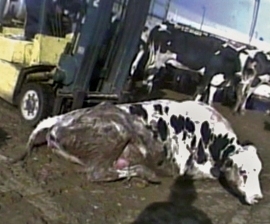 California lawmakers are considering an “ag-gag” bill today that not only criminalizes undercover investigators and whistleblowers, but carves out special exemptions if the industry accidentally documents its own abuses.
California lawmakers are considering an “ag-gag” bill today that not only criminalizes undercover investigators and whistleblowers, but carves out special exemptions if the industry accidentally documents its own abuses.
As background: Ag-gag bills are facing massive public opposition across the country, and the industry is shifting how it talks about these bills. Factory farmers are moving away from attempts to outright criminalize anyone who photographs animal cruelty; instead, they’re introducing “mandatory reporting” requirements. Take California, for example. AB 343 says anyone who documents animal cruelty at farms and slaughterhouses has to notify the police. That sounds pretty reasonable, right?
But as I’ve discussed before, those reporting requirements are intended to intimidate whistleblowers, and keep them from documenting a pattern of abuses.
And on top of that, now groups like the California Cattlemen’s Association have included new language in the legislation: everyone who records animal cruelty has to turn it over to the police, unless the recording was made by the industry itself:
(3) This section does not apply to the inadvertent capture of an image otherwise governed by this section through the use of video surveillance, security systems, or other imaging systems.
One has to wonder: If these bills are really about stopping animal cruelty, as the industry is suddenly claiming, then why exempt itself?
The truth is that these bills are not about stopping cruelty, they are about stopping the exposure of cruelty. Big Ag groups are playing dumb and saying they have no idea what happens on their farms. But they know perfectly well. They just don’t want you to know.
It’s telling that every major newspaper in California has editorialized against these bills, citing First Amendment concerns. Here are a few: The Los Angeles Times, Sacramento Bee, Bakersfield Californian, and San Francisco Chronicle.
Even more telling is the list of groups that have signed in support and opposition.
Supporters of ag-gag include:
California Cattlemen’s Association
California Farm Bureau Federation
California Grain & Feed Association
California Horse Council
California Pork Producers Association
California Thoroughbred Breeders Association
Ventura County Cattlemen’s Association
Opponents of ag-gag include the Teamsters, ASPCA, Sierra Club, Humane Society of the United States, Animal Welfare Institute, California Labor Federation, California Newspaper Publishers Association, Organic Consumers Association, Whistleblower Support Fund, and many, many more.
If you share the concerns of labor unions, whistleblowers groups, animal welfare groups, environmentalists, and journalists, take action by contacting California lawmakers today.
UPDATE: Great news: California’s #AgGag bill was just pulled by sponsor! No hearing today. The bill is dead.
April 15, 2013
Ag Industry Says Investigators “Just Want to Get That Sweet Cow-Head-Kicking Cash”
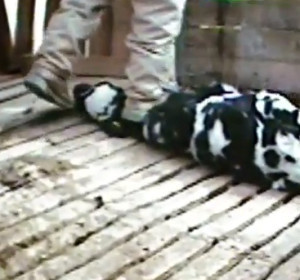 Sometimes you just have to laugh to keep yourself from screaming. Or at least that’s how I feel most days, especially when I hear the Big Ag public relations machine trying to defend “ag-gag” bills that target anyone who photographs and videotapes animal abuse on factory farms. So it was a lot of fun to be on Citizen Radio and talk about these attempts to keep consumers in the dark.
Sometimes you just have to laugh to keep yourself from screaming. Or at least that’s how I feel most days, especially when I hear the Big Ag public relations machine trying to defend “ag-gag” bills that target anyone who photographs and videotapes animal abuse on factory farms. So it was a lot of fun to be on Citizen Radio and talk about these attempts to keep consumers in the dark.
My favorite part of the interview was discussing the slanderous statements of corporate front groups like the Animal Agriculture Alliance. Emily Meredith of the Ag Alliance told CNN that undercover videos by groups like the Humane Society and Mercy for Animals are “manipulated, edited, and staged” to make money. She said the same thing when we were on Democracy Now, and the same thing when we were on Al Jazeera. It’s an outright lie.
If there was any evidence of video “manipulated” or “staged,” these corporations should alert prosecutors, because it has led to criminal convictions just this week in Wyoming and North Carolina.
And it’s hard to believe that the corporations responsible for this horrific cruelty can say groups like the Humane Society have “staged” it all. Think about this for a second: this industry actually has the nerve to say that the Humane Society “staged” workers slamming piglets to death on concerete floors. And that it’s all so animal advocates can make money.
As I said on Al Jazeera:
“There is a difference between saying that a video has been edited, to condense it to a few minutes, to present on YouTube, and a different thing entirely to allege that these videos have been doctored, manipulated or manufactured, which is what the industry seems to be saying right now. There is no evidence of this.”
But I like Jamie Kilstein’s response to this absurdity on Citizen Radio better:
“Yeah, Mercy for Animals doesn’t care about animals. They just want to get that sweet cow-head-kicking cash!”
Listen to the full show on Citizen Radio!
And if you’re not following Jamie Kilstein and Allison Kilkenny (and her blog at The Nation) already, you’re missing out.
April 14, 2013
Legalizing Animal Abuse? HSUS CEO Wayne Pacelle and Will Potter Discuss Ag-Gag Laws
 Al Jazeera had an excellent program about “ag-gag” legislation recently. Inside Story, hosted by Shihab Rattansi, discussed the new laws with me and Wayne Pacelle, the president and CEO of The Humane Society of the United States. Shihab had thoughtful questions pushing the industry representative, and Wayne did a fantastic job as well. I hope you’ll check it out.
Al Jazeera had an excellent program about “ag-gag” legislation recently. Inside Story, hosted by Shihab Rattansi, discussed the new laws with me and Wayne Pacelle, the president and CEO of The Humane Society of the United States. Shihab had thoughtful questions pushing the industry representative, and Wayne did a fantastic job as well. I hope you’ll check it out.
Watch below or on Al Jazeera! And please sign the petition at Change.org/AgGag
April 9, 2013
Democracy Now! Debate: After Activists Expose Animal Cruelty, Should They Be Targeted With “Ag-Gag” Laws?
Democracy Now, the award-winning international news program with Amy Goodman, devoted its entire program today to “ag-gag” bills that criminalize undercover investigators who film animal welfare abuses on factory farms and slaughterhouses (and some bills, like Indiana and North Carolina, also include fracking, mining, and other industries).
Amy Goodman interviewed an anonymous undercover investigator who has worked with Mercy For Animals. It’s a fantastic interview, and you can watch it here.
The show also featured a debate between me and Emily Meredith of the Animal Agriculture Alliance, a industry group comprised of corporations from the Big Ag industry and sponsored by companies like Monsanto.
Here’s a summary from Democracy Now:
So-called “ag-gag” bills that criminalize undercover filming on farms and at slaughterhouses to document criminal animal abuse are sweeping the country. Five states, including Missouri, Utah and Iowa, already have such laws in place. North Carolina has just become the latest state to consider such a law, joining a list that includes Arkansas, California, Indiana, Nebraska, Pennsylvania, Tennessee and Vermont. Many of these bills have been introduced with the backing of the American Legislative Exchange Council, or ALEC, a mechanism for corporate lobbyists to help write state laws. We host a debate on the Ag-Laws with two guests: Independent journalist Will Potter; and Emily Meredith, communications director for the Animal Agriculture Alliance.
Watch the video here.
Want to take action? Please sign the petition at Change.org/AgGag
April 8, 2013
Breaking: New Ag-Gag Bill Introduced in North Carolina on Same Day Butterball Worker Pleads Guilty to Cruelty
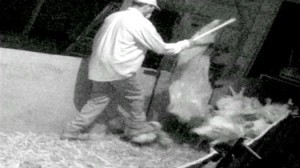 North Carolina is the latest state to consider a new law targeting whistleblowers, undercover investigators, and journalists who expose factory farms. The legislation was introduced on the same day that a fifth Butterball employee pled guilty to criminal cruelty to animals — charges that wouldn’t be possible without the undercover investigations that bills like this aim to criminalize.
North Carolina is the latest state to consider a new law targeting whistleblowers, undercover investigators, and journalists who expose factory farms. The legislation was introduced on the same day that a fifth Butterball employee pled guilty to criminal cruelty to animals — charges that wouldn’t be possible without the undercover investigations that bills like this aim to criminalize.
The wave of legislation called “ag-gag” bills has been met with increasingly mainstream media exposure and outrage, such as the excellent front page story in the New York Times this week.
North Carolina’s SB 648, the “Commerce Protection Act,” is a good example of how corporations and industry groups are responding to the media backlash.
The bill doesn’t include any “terrorism” language, as others have in the past, and it doesn’t mention animal agriculture at all.
Don’t be fooled, though. This ag-gag bill shares the same language and provisions as about a dozen others across the country.
SB 648 says: “It is unlawful for any person to willfully make false statements or representations or to fail to disclose requested information as part of an employment application” if the purpose is to “to create or produce a record that reproduces an image or sound occurring within the employer’s facility, including a photographic, video, or audio” or “to capture or remove data, paper, records, or any other documents…”
It goes on to say that “Any recording… shall be turned over to local law enforcement within 24 hours.”
These are the 3 common provisions in ag-gag bills across the country: 1) photography bans, 2) job application / fraud, and 3) mandatory reporting within 24 hours.
It’s transparent that this bill is a direct response to the undercover investigation of Butterball by Mercy for Animals that led to criminal convictions, and ousted a top state government official for fraud. (For a more detailed look at that case, and ag-gag bills nationally, check out my article in Vice).
The fact that this bill emphasizes fale statements over photography isn’t a safeguard for journalists. Remember, North Carolina was also the home of the landmark lawsuit by Food Lion against journalists who exposed unsanitary practices. The basis of that suit? Fale statements on job applications.
And much like Indiana’s sweeping ag-gag bill, this isn’t confined to animal agriculture. All industry is affected. This isn’t just a threat to animal activists, it’s an assault on anyone who exposes corporate abuse, especially workers and whistleblowers.
April 4, 2013
Daniel McGowan Back in Jail Days After Writing About His Secretive Prison Unit for Huffington Post
 I was supposed to meet Daniel McGowan for coffee today, and got an email from him last night that his work pass was denied. The revocation of his pass was a surprise, because McGowan has done everything possible to adjust himself to life post-prison, including securing a job at a law firm, and reporting to work and to his halfway house every day on time. However, he expected to be able to go back to work on Friday. Instead, he was taken into custody.
I was supposed to meet Daniel McGowan for coffee today, and got an email from him last night that his work pass was denied. The revocation of his pass was a surprise, because McGowan has done everything possible to adjust himself to life post-prison, including securing a job at a law firm, and reporting to work and to his halfway house every day on time. However, he expected to be able to go back to work on Friday. Instead, he was taken into custody.
He is now imprisoned at the Metropolitan Detention Center in New York City.
There has been no official word from the Bureau of Prisons about his re-incarceration, and attorneys at the Center for Constitutional Rights are working on this now. But the drastic move comes just days after McGowan wrote about his experiences in a secretive prison unit for domestic terrorists called a Communications Management Unit (CMU), and it fits an on-going pattern of behavior by the Justice Department and Bureau of Prisons attempting to keep this prisons out of the public spotlight.
As background: McGowan was convicted in 2006 for his role in two Earth Liberation Front arsons in opposition to genetic engineering and to the logging of old-growth forests. He was profiled in the Oscar-nominated documentary “If a Tree Falls.” McGowan was sentenced to 7 years in prison, and the court applied what’s called a “terrorism enhancement.”
The terrorism enhancement reclassified McGowan within the Bureau of Prisons, and he was later moved to a CMU. As I have reported extensively, these prison units radically restrict prison communications to the outside world, to levels that meet or exceed some of the most restrictive prison units in the country. In the government’s proposal to make these prison units permanent, they were described as facilities for prisoners with “inspirational significance.” [For additional information about the CMUs, here is an interview I did with Democracy Now.]
McGowan was released to a halfway house in Brooklyn to serve the last few months of his sentence. After receiving new court documents related to his incarceration, he wrote an article for the Huffington Post this week: “Court Documents Prove I was Sent to Communication Management Units (CMU) for my Political Speech.”
Memos authored by Leslie Smith, the Chief of the CMU, reveal that McGowan was targeted his political beliefs. In his writing, McGowan outlined some of the speech that was used to justify his transfer to a domestic terrorist prison:
My attempts to “unite” environmental and animal liberation movements, and to “educate” new members of the movement about errors of the past; my writings about “whether militancy is truly effective in all situations”; a letter I wrote discussing bringing unity to the environmental movement by focusing on global issues; the fact that I was “publishing [my] points of view on the internet in an attempt to act as a spokesperson for the movement”; and the BOP’s belief that, through my writing, I have “continued to demonstrate [my] support for anarchist and radical environmental terrorist groups.”
If McGowan’s incarceration is retaliation for his First Amendment activity, it would fit a pattern of behavior by the Justice Department and Bureau of Prisons to keep these units secretive.
As I reported in my book, journalists are not allowed in the CMUs. I was permitted to visit McGowan in the CMU only as a friend, and McGowan was told that if I asked any questions or reported about the visit he would be punished. The government threatened to retaliate against a prison for the First Amendment activity of a reporter.
A Freedom of Information Act request revealed that the Counter-Terrorism Unit has kept files on journalists’ lectures, articles, and media interviews about the CMUs.
Examples like this highlight why it should come as no surprise that the Bureau of Prisons would retaliate against McGowan for speaking up about these secretive units. The BOP and the Counter Terrorism Unit have only been able to surveil journalists and make indirect threats: with McGowan, they are able to directly punish him.
It’s hard enough to transition from life in prison to a “normal” life back home in New York. It’s especially traumatic to then be ripped from that, and put back behind bars. Please consider writing him a letter:
DANIEL McGOWAN
#63794-053
MDC BROOKLYN
METROPOLITAN DETENTION CENTER
P.O. BOX 329002
BROOKLYN, NY 11232
April 2, 2013
Indiana Bill Would Make It Illegal to Expose Factory Farms, Clearcutting and Fracking
 Indiana lawmakers are considering a bill that would make it illegal to photograph or videotape things like factory farming, clear-cutting forests, mining, and fracking.
Indiana lawmakers are considering a bill that would make it illegal to photograph or videotape things like factory farming, clear-cutting forests, mining, and fracking.
You read that correctly. Under Indiana’s SB 0373, anyone who sets foot on corporate property in order to document environmental, animal welfare, and health violations of these industries would face criminal penalties.
The bill has already passed the Senate, and is on track to pass the full House. It is part of a wave of similar legislation introduced across the country that have been dubbed “ag-gag” bills. [Here's a detailed look at ag-gag efforts nationally.] But Indiana is poised to become the first state to pass an ag-gag bill this year.
This ag-gag trend is the brainchild of the Big Ag industry, working with the American Legislative Exchange Council. What’s especially troubling about Indiana’s bill, though, is that it extends far beyond factory farms to the timber, mining, and manufacturing industries.
The text of the bill lists “agricultural operations” such as “crops,” “livestock,” “poultry,” horticultural products,” and “growing timber.” It also lists “industrial operations,” which is pretty much everything connected to industry: the “manufacture of a product from other products, “transformation of a material from one form to another,” “mining of a material and related mine activities,” or “storage or disposition of a product or material.”
If that’s not bad enough, the bill also targets:
* Workers and whistleblowers — the bill places a 48-hour requirement on anyone reporting criminal activity, which makes it impossible to document a pattern of abuse.
* Journalists — the bill places special emphasis on anyone who “distributes, disseminates, or transfers the image, photograph, video recording, or motion picture,” and specifically targets those who distribute this materials to the press. The Hoosier State Press Association has spoken against it.
As the Indianapolis Star editorialized: “The measure is unnecessary and the cost is too great, not only to investigative journalists, animal rights activists and other keenly interested parties, but also to the general public.”
If you care about the environment, workers’ rights, animal welfare, or consumer safety, this bill is a blatant attempt to keep you in the dark. And it’s on the verge of passing.
Want to take action?
Contact Indiana lawmakers
Sign the petition against ag-gag bills

